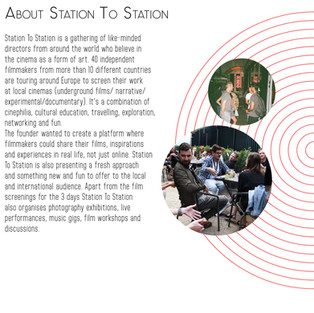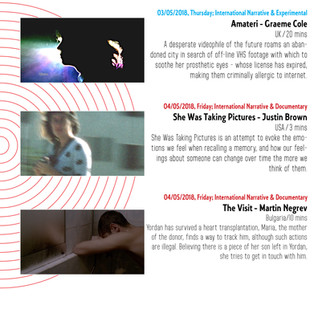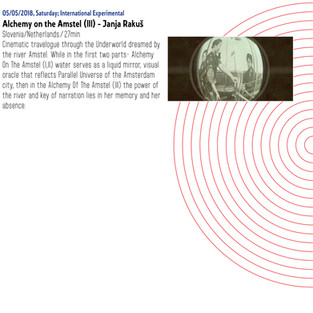Who are you?
I think to describe oneself we should look at the things we do, the reasons why we do what we do and what do we value or try to avoid. I try not to limit myself to one field, label or title - that seems to be a frequent demand rather from the outside, while to me it’s more important to sustain an inner integration. I’ve gained a lot of very useful skills and knowledge at the universities but I think it’s mostly all the experiences in life outside university that make me who I am today, as well as the people that I’ve met throughout my life and my idols. I love literature, art, music, anthropology and philosophy just as much as I love the cinema and I think they’re equally important to the individual self-growth, as well as the growth of the society and our understanding of the culture. I guess cinema speaks to me the most and the connection I feel to some films, the characters and their reality or even the directors is the most intense and inspirational. In 2016 I founded a travelling international film festival called Station To Station in order to promote and support independent filmmakers by screening their work at local cinemas around Europe, and also to discover new local artists while travelling.

What is your personal experience with cinema/ film?
I’ve been obsessed with cinema since a very young age, maybe I value it so much because I was mostly discovering it all by myself. It’s a very unique space of my life where I can think so completely independently and develop my own views, opinions and perception of the reality, it expanded my horizons and gave me the courage to trust myself rather than blindly follow the crowd. I’ve been making experimental films since high-school, but I was made to think they’re useless because they don’t fit to the conventional ‘filmmaking’ style. I then discovered the films of Maya Deren, Chris Marker, Andrei Tarkovsky, Ingmar Bergman and Jonas Mekas and realised that cinema doesn’t need to be all the same or hackneyed in a way. I really enjoy and respect the filmmakers who are not afraid to create something that would challenge the viewer. One of my best decisions was to finish my degree at the Plymouth College of Art. I met a lot of artists who work ‘out of the box’ there and tutors really support an individual and experimental approach towards film-making. Unfortunately authenticity doesn’t mean you’ll get a chance to work in the industry, and there was a time when I thought of giving up but I guess too many factors pull me towards that path anyway and I don’t believe in coincidence. One day in Camden Town I saw a man whose picture I had on my phone desktop at that time, he came up to me and said “Hi, I’m Johnny”. It was Jonathan Rhys Meyers from the film Velvet Goldmine and he gave me beautiful advice. One thing in particular was to ignore the industry and keep doing what I love and that if I have talent I’ll be recognised some day;
and I was – by myself and by people whose opinion really matters to me,
and that seems to be enough. So I’d like to give the emerging filmmakers the chance to recognise themselves too. I think that encouragement and support are fundamental and can really make a difference in someone’s life. Without the support of my parents, sister and friends I wouldn’t be able to do what I do.
How did you come up with the idea of a travelling film festival?
I met a lot of filmmakers, musicians, photographers and artists through travels around Europe and also on Facebook and ‘friends of friends’ kind of way. There’s a few really great pages on Facebook, like Chaotic Cinema, Confessions of a Cinephile and Experimental Film Society where you can discuss films and find out about international filmmakers. I’ve had the idea to start a film club for quite a while. I was inspired by the Imperfect Cinema in Plymouth, founded by Allister Gall and Dan Paolantonio, where they screen all sorts of experimental films made by students. Last year one of my friends, Daniel Fawcett from the Underground Film Studio, asked me if I could help to organise a screening in Poland of the new feature film called The Kingdom Of Shadows, which he made with Clara Pais. I started looking at all possible venues and cinemas and thought ‘why not try to organise a screening of more films, to make a film event?’ and so I started organising the first edition in Poland. I booked the cinema, collected the films and invited the directors. It’s not like it hasn’t happened before, you can book a cinema to screen your work. In 1946 Maya Deren booked the Village Providence Playhouse in Greenwich Village for her public exhibition titled Three Abandoned Films, which led Amos Vogel to found Cinema 16, the New York City-based film society that consisted mostly of experimental films. I think I’m creating an informal film society with similar aims, but I thought it could be a mobile society, rather than being based in one place. Our plan is to go to different places, different countries. It’s a very cooperative and collective initiative and usually my friends help to organise it locally. It’s fantastic to see the enthusiasm and spark in the group and to see that so many of us really want to make it work. I think it’s appealing, because it’s not only about the cinema, it’s also about getting to know different cultures and to explore new films and the history of the local cinema. That’s a great opportunity to give the less popular cinema a chance to be recognised internationally and also to broaden our horizons; and seriously there are some genuinely brilliant films being made.

Why choose a film festival as your platform?
I wanted to create a platform where we could share our films, inspirations and experiences, but in real life not just online. It’s so different when you can speak in person to your cinematic soul-mate who lives so far away, for hours after the screenings. For example I’m really bad at the online communication, but I usually engage in deep and enlightening conversations in real life. I find it’s lovely and inspiring to meet such interesting artists, not to mention we have loads of fun together! That’s something fun to offer to the viewers as well and to give them the chance to speak to the filmmakers in person, not in a formal or pompous way. I think that the selection of commercial cinemas limit our choices of what we can see on the big screen, but to be honest I think that it can be balanced. From my observation people are craving for something different. I’m very happy that the art house and less commercial cinemas are becoming more popular. I think it’s very important to respect the viewers and believe in their abilities to understand some kind of transcendence and poetry in films. Notice that all the most legendary directors have challenged us. That’s how we grow, individually and as a society. It allows us to become more open-minded, attentive, respectful and most importantly it allows us to think independently and individually. Station To Station is not as formal as other festivals and we don’t decide which film is best, because that is so subjective and very often one film can be hated by one person while someone else might absolutely love it and feel enriched by it; also in my opinion it should never be a competition. I don’t think we’re competing in a healthy way in our society, cinema is all about connection. During the festival we talk about everything; our pets, philosophy, Twin Peaks, Freud, Aldous Huxley, Patti Smith, Syd Barrett, Nietzsche, Gilles Deleuze, Alan Watts, Iggy Pop, Hitler and Persian poets. Everything is quite random and accidental and we always meet peculiar people and just go with the flow.
What has been the reception to the festival in the places you have visited?
The first edition in Warsaw in June 2017 was deep waters to me, organising it in 3 months time. The venue of the Amondo cinema in Warsaw wasn’t very big but the owners are independent filmmakers themselves and the ambience was perfect; red neon lights, lots of plants, retro jukebox and delicious cocktails. We received a great support from the Polish Film Institute and my favourite film festival in Poland- The New Horizons. They provided us with giftpacks for the filmmakers with the DVDs, bags, calendars and magazines about the Polish cinema, it’s history and directors. The Plymouth College of Art also supported the alumni whose films we were screening and to my astonishment it all went really great! I invited a Polish band to perform live at the cinema, the 2nd Hand Beatnix who apparently got a blessing from Allen Ginsberg himself. The first edition in Warsaw was a huge success and I got great reviews from the filmmakers and the audience. The second edition took place in Sofia in September 2017 at the G8 Cultural Centre. My co-organisers Tyanita Gancheva and Savina Eliseeva did a truly fantastic job founding sponsors and Bulgarian directors. We stayed at a really cool hostel with the most hippie manager you can imagine. The third edition of the festival, co-organised by Inger Kitt, took place at the Artis Kino in Tallinn in May 2018 and it completely surpassed my expectations. The screening room was the biggest so far.

There was 20 of us sharing a fantastic surreal 90’s Eastern-style house. This edition was also the most educational – our partner, the Estonian Film Museum organised a guided tour for us and provided the directors with the books about the history of Estonian cinema; I found it to be the best film museum I have ever visited! We went to see the locations of the scenes from Stalker shot in Tallinn, by Andrei Tarkovsky, one of our favourite directors of all time. We had very productive discussions about the
independent cinema and the Estonian film industry. I organised film workshops at the Retrosonic Recording Studio where we explored experimental narrations with the use of the Estonian Folktales. One day of the screenings was dedicated to the local Estonian filmmakers and I also managed to have a tour at the Baltic Film and Media School interviewing students and tutors. Tallinn is a dangerous city – if you want to go out for one drink you don’t go back home until morning, and even if you hate techno you just dance in the club until the dawn because of the ambience and the people. They are so positive and welcoming, I love Estonia! We have so many plans now but the next edition might happen in Barcelona in the autumn – I’ll be informing about it on our website and Facebook page. I can’t wait actually!
Do you have a ‘Dream’ destination you would like to take the festival, and if so why that specific place?
I think it all happens as it grows, very spontaneously. For me personally there isn’t any specific dream destination, maybe something that surprises me. I would love to go to Sweden or to Helsinki and discover Finnish filmmakers, as well as Italy, Iceland, south of France etc. I’m very happy to have students of Bela Tarr’s Sarajevo Film Academy in our club and we’re thinking actually of going to Sarajevo too. Personally, I’d be happy to see other cities besides just capitals because capitals are always a bit different than the rest of the country. That being said if you know where to look even in the capitals, not just the tourist sights but ordinary life can be fascinating, it all depends what you pay attention to. Hopefully some day we’ll be able to travel outside of Europe, we’ll see what happens. It’s about the joy of doing it and celebrating the present moment, so there’s no pressure or a final destination that I’d aspire to. Wherever we’re welcome.
What has been the hardest part of your journey (from inception to realisation) so far?
Probably money, it always seems to be an issue when it comes to independent-art projects. At the moment it’s my private non-profit initiative and basically there is no budget. Looking for sponsors to cover some of the costs can be tough, but even if we can’t get a financial supporter we usually get a very friendly response with wishes of best luck and an offer to help with promotion of the event. It turns out that a great issue is time as well. I’m doing my Masters Degree in Culture and Film Theory in Poland and it keeps me very, very busy; but so far so good.
I’d like the filmmakers to be recognised (by each other and by themselves mostly)

What would you say is the ‘ideal’ situational outcome for the festival in terms of what it is you would like to personally and professionally achieve?
I’d like the filmmakers to be recognised (by each other and by themselves mostly), but also by the audience and professionals in the industry and to be able to make the kind of films they want, especially financially. I’d also like to show that this kind of work is welcome and appreciated at cinemas and by the audiences. Another ideal outcome is simply promotion of the independent and experimental cinema and getting it into the local cinemas and introducing people to the less popular cinema, like the Bulgarian or Estonian one. Making friendships; also a collaborative project would be a fantastic outcome.
What has been the most stand out moment of the entire process from your perspective (be it simply getting it off the ground to the reaction etc)?
I think the most amazing thing to me is that an idea that not so long ago seemed pretty unrealistic and far away is actually happening in front of my eyes. I’m very happy about the viewers’ reactions, I think to keep on going it’s essential to know that what you do actually makes sense and that people enjoy that kind of screenings. The reaction of the directors is also very important to me and that is also my best memory, they seem to really enjoy themselves. I think we’re happy to be able to share our work in other countries, discuss the condition of the cinema nowadays and inspire each other. The language of cinema goes really beyond the words, and just like music it connects people on a different level. When we go to parties afterwards the conversations can be very refreshing at 4am in an unfamiliar city! Plus all the simple things, like the charming cafés and live music, the Bulgarian food and the Estonian positive vibes. Also when you meet your friends once in 2, 3 months, you have quite a lot to talk about. During these reunions you can see how someone grew and maturated as well as their work, and that’s really uplifting.
What are your aspirations going forward?
I’d love to still be able to continue the Station To Station adventure. Also I’d like to successfully finish my Masters Degree and to find a job in an environment that inspires me. To still discover new exciting international productions. To finally find time to make a film. To spend some time on the seaside, learn Swedish and Finnish and start practising Tai Chi. But I suppose ‘more doing and less talking’ is a good motto!
Iga Rita Stepien
Founder of Station To Station - International Independent Film Festival
POSTER.SCHEDULE.BOOKLETby
Arun Nura Neelavelicham


















































Comentários